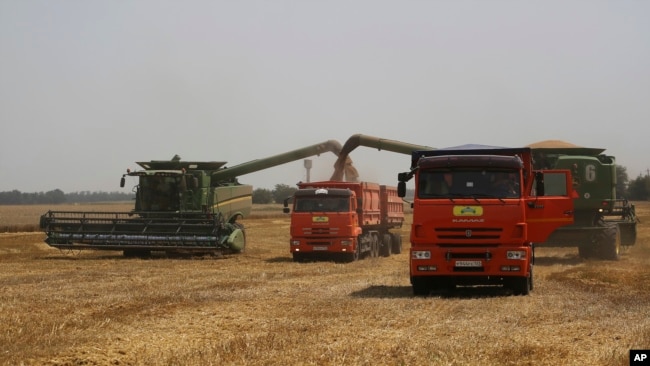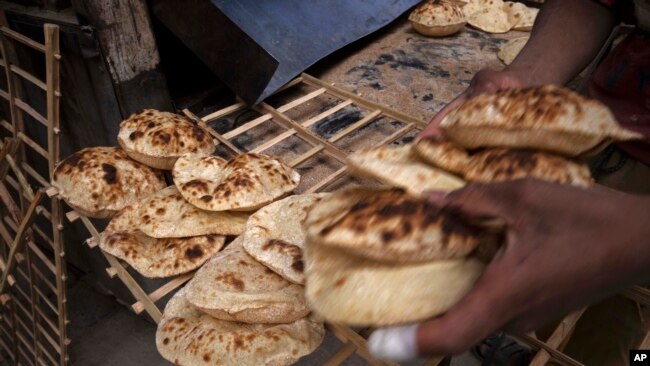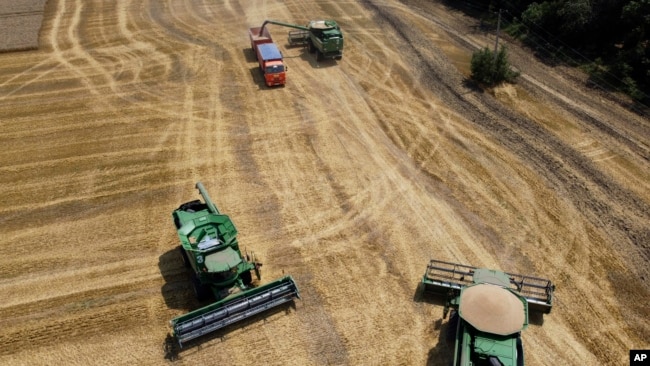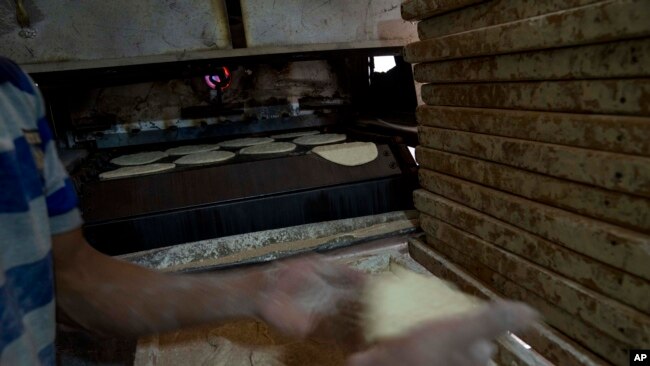ロシアによるウクライナ戦争がもたらす世界食料危機
原油高による食料品の値上がり、電気・ガスなどの値上げで悲鳴を上げたばかり。なのにさらに、さらに、さらに・・・
コロナによる増税が来るぞ、と覚悟していましたが、その前に。。。食料危機が。
アフリカなどの人口増加による食糧危機到来と警告がなされていましたよね。
報道によれば、ロシアとウクライナで全世界の小麦の三分の一の供給量だそうです。
食料自給率を高めなくては!! やっぱり貯蓄!! でも、ハイパーインフレで紙切れにならないかな〜? 金も値上がりしてるしな〜。(心千々に乱れて)
VOAで英語を学び、世界を見つめましょう!!
ウクライナ戦争で多くの国の食糧供給が脅かされている(和訳)
Ukraine War Threatens Food Supplies in Many Nations
March 07, 2022
国際的な専門家は、ウクライナでの戦闘が続くと、ヨーロッパ、アフリカ、アジアの多くの人々に大規模な食糧不足を引き起こす可能性があると警告しています。
ロシアは2月24日にウクライナに侵攻した後、ウクライナ全土で軍事作戦を推し進め続けています。
ウクライナは世界第5位の小麦輸出国であるため、”世界の穀倉”と呼ばれています。しかし、何百万人もの人々が戦い、逃げ、生きるために奮闘しているため、ウクライナの農業システムは崩壊しています。港が閉鎖され、小麦をはじめとする重要な生産物が世界中に輸出されなくなりました。小麦はパンや麺類、家畜の飼料として国際的に広く利用されています。
また、欧米諸国がロシア政府に課している経済制限により、ロシアの穀物輸出が減少することが懸念されています。ロシアはもう一つの主要な食料供給国です。
まだ世界的に小麦の供給に支障は出ていませんが、価格は侵攻の1週間前から55%上昇しています。
アルノー・プティ氏は国際穀物協会を指導しています。同氏はAP通信に対し、戦争が長期化すれば、ウクライナからの小麦輸出に依存する国々は7月から不足に直面する可能性があると述べています。
このような不足は、エジプトやレバノンのような場所で食糧不安を引き起こし、より多くの人々を貧困に追いやる可能性があります。これらの国では、多くの人々が政府の支援するパンプログラムに頼っています。
エジプトは世界最大の小麦輸入国です。カイロに住む47歳の7児の父、アハメド・サラーさんはAP通信に、食糧不足は常に食糧価格の上昇をもたらすと語っています。それは、大多数のエジプト人に”壊滅的な”影響を与える可能性があるといいます。
アンナ・ナグルーニー氏はマサチューセッツ大学アマースト校のサプライチェーンと経済学の専門家です。彼女はAP通信に、小麦、トウモロコシ、油、大麦、小麦粉は、特に世界の貧しい地域における食糧安全保障にとって非常に重要であると語ります。ナグルーニー氏はウクライナの男性が戦いに召集される中、ナグルーニーさんは「誰が収穫をするの?輸送は誰がするの?」と問いかけます。
紛争が続くシリアは最近、支出を削減し、一部の食料を配給する措置をとると発表しました。近隣のレバノンでは、ウクライナが供給の60%を占めているため、当局は予測される小麦不足を補うことを模索しています。
ワンディレ・シロボ氏は、南アフリカ農業ビジネス会議所のチーフエコノミストです。同氏によると、アフリカ諸国は2020年にロシアから40億ドル相当の農産物を輸入し、その輸入の約90%が小麦だといいます。
ナイジェリアでは、小麦粉生産者は、ロシアからの小麦の供給が不足すれば、アフリカで最も人口の多い国の一般的な食品であるパンの価格に影響を及ぼすと考えています。
将来的には”私たちは皆、他の場所に目を向ける必要がある”とトペ・オグン氏は言います。彼は、ナイジェリア最大の小麦粉加工会社の1つであるHoneywell Flour Mills Plcに所属しています。「必要なものが手に入らないかもしれないし、価格も上がるかもしれない」とオグン氏は付け加えます。
この混乱は、小麦が麺類、パン、揚げ物、スナック菓子の材料として使われる、遠く離れたインドネシアでも感じられることでしょう。ウクライナは昨年、インドネシアで2番目に大きな小麦の供給国であり、同国で使用される小麦全体の26%を供給しています。麺類の価格上昇は低所得者層に打撃を与えると、貿易省の調査活動を率いるカサン・ムーリ氏は言います。
ウクライナはEUにトウモロコシの約60%、牛やその他の動物の飼料に必要な穀物の重要な成分の約半分を供給しています。ロシアも同様に、肥料、小麦、その他の穀物の主要な供給国です。
スペインでは、ロシアの侵攻から2日間で飼料用穀物の価格が公開市場で10%上昇しました。ウクライナでの戦闘が続けば、ひまわり油も穀物もさらに値上がりするとの見方があります。ウクライナでは、約5500万頭の豚の飼料を輸入穀物に依存しており、すでに穀物不足を感じています。
Ukraine War Threatens Food Supplies in Many Nations
International experts are warning that continued fighting in Ukraine is likely to cause major food shortages for large populations in Europe, Africa and Asia.
Russia continues to push its military campaign across Ukraine after invading the country on February 24.
Ukraine has been called the “breadbasket of the world” because it is the world’s fifth-largest wheat exporter. But Ukraine’s farming system has been disrupted as millions of people fight, flee or struggle to stay alive. Ports have been closed, preventing wheat and other important products from being exported worldwide. Wheat is widely used internationally to make into bread, noodles and animal feed.
There are also worries that Russia could have its grain exports reduced by economic restrictions placed on Russia’s government by the West. Russia is another major food provider.
While there have not yet been worldwide disruptions to wheat supplies, prices have risen 55 percent since a week before the invasion.
Arnaud Petit directs the International Grains Council. He told The Associated Press that if the war continues for an extended period, nations that depend on wheat exports from Ukraine could face shortages starting in July.
Such shortages could create food insecurity and push more people into poverty in places like Egypt and Lebanon. Many people in those countries depend on government-supported bread programs.
Egypt is the world’s largest wheat importer. Ahmed Salah, a 47-year-old father of seven in Cairo, told the AP that shortages always bring higher food prices. That, he said, could have “catastrophic” effects on the majority of Egyptians.
Anna Nagurney is an expert on supply chains and economics at the University of Massachusetts Amherst. She told the AP that wheat, corn, oils, barley and flour are extremely important to food security, especially in poorer parts of the world. With Ukrainian men being called on to fight, Nagurney asked, “Who’s going to be doing the harvesting? Who’d be doing the transportation?”
Syria, which is still involved in conflict, recently announced it would cut spending and take steps to ration some foods. In nearby Lebanon, officials are seeking to make up for a predicted wheat shortage, since Ukraine provides 60 percent of its supply.
Wandile Sihlobo is chief economist for the Agricultural Business Chamber of South Africa. He said African countries imported agricultural products worth $4 billion from Russia in 2020. He said about 90 percent of those imports were wheat.
In Nigeria, flour producers believe a shortage of wheat supplies from Russia would affect the price of bread, a common food in Africa’s most populous country.
“All of us need to look elsewhere” in the future, said Tope Ogun. He is with Honeywell Flour Mills Plc, one of Nigeria’s biggest flour processing companies. “We might not get what we need to, and there is likely going to be an increase in the price,” Ogun added.
The disruption can be felt as far away as Indonesia, where wheat is used to make noodles, bread, fried foods and snacks. Ukraine was Indonesia’s second-largest wheat supplier last year, providing 26 percent of all wheat used in the country. Rising prices for noodles would hurt lower-income people, said Kasan Muhri, who heads the trade ministry’s research efforts.
Ukraine supplies the EU with about 60 percent of its corn and nearly half of an important ingredient in the grains needed to feed cows and other animals. Russia is similarly a major supplier of fertilizer, wheat and other grains.
In Spain, the price of grain for animal feed rose 10 percent on the open market in the first two days of Russia's invasion. Officials there expect prices to rise further for both sunflower oil and grains if the fighting in Ukraine continues. The country is already feeling a grain shortage, even as it depends on imported grains to feed about 55 million pigs.
Words in This Story
disrupt – v. to interfere with something and stop it from continuing as it should
noodle – n. a thin often flat strip of fresh or dried dough (as of flour and egg) that is usually boiled
supply chain – n. a system of organizations or operations that work together to design, produce and deliver a product to the market
ration – v. to give people only a small amount of something because there is little of it available
snack – n. a small amount of food that is usually eaten between meals
ingredient – n. one of the things that are used to make a food, product, etc.
fertilizer – n. a natural or chemical substance you put on land in order to make plants grow well



